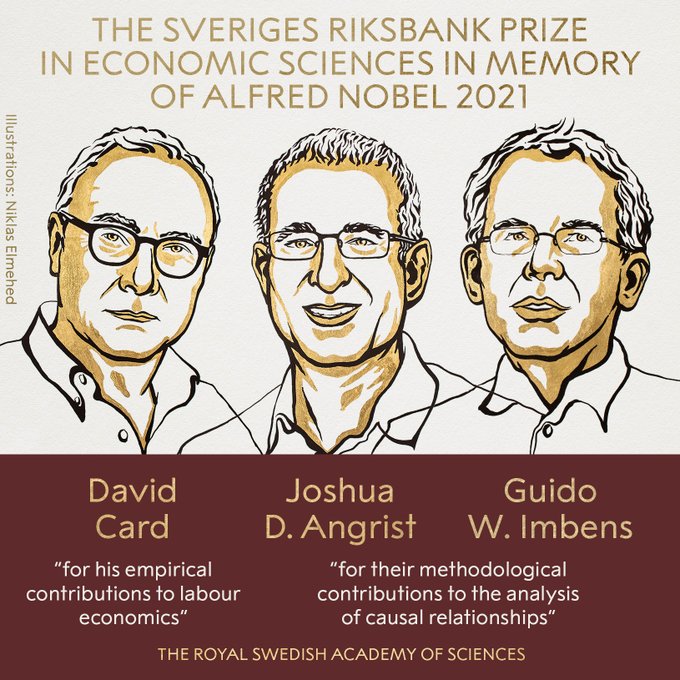 Nobel Prize Economics
Nobel Prize Economics David Card, Joshua Angrist and Guido Imbens win Nobel Prize in Economics
US-based economists David Card, Joshua Angrist and Guido Imbens clinched the 2021 Nobel economics prize on Monday.
Canadian-born David Card belongs to the University of California, who was awarded half of the prize for his research on how minimum wage, immigration and education affect the labour market.
The other half of the prize was shared by Joshua Angrist of the Massachusetts Institute of Technology and Dutch-born Guido Imbens of Stanford University, who researched on a framework for studying issues that can’t depend on traditional scientific methods.
A statement released by the Royal Swedish Academy of Sciences said: "Many of the big questions in the social sciences deal with cause and effect. How does immigration affect pay and employment levels? How does a longer education affect someone’s future income?"
"These questions are difficult to answer because we have nothing to use as a comparison. We do not know what would have happened if there had been less immigration or if that person had not continued studying," read the statement.
However, this year’s Laureates have shown that it is possible to answer these and similar questions using natural experiments. The key is to use situations in which chance events or policy changes result in groups of people being treated differently, in a way that resembles clinical trials in medicine.
Using natural experiments, David Card has analysed the labour market effects of minimum wages, immigration and education. His studies from the early 1990s challenged conventional wisdom, leading to new analyses and additional insights.
The results showed, among other things, that increasing the minimum wage does not necessarily lead to fewer jobs.
"We now know that the incomes of people who were born in a country can benefit from new immigration, while people who immigrated at an earlier time risk being negatively affected. We have also realised that resources in schools are far more important for students’ future labour market success than was previously thought," read the statement.
Data from a natural experiment are difficult to interpret, however. For example, extending compulsory education by a year for one group of students (but not another) will not affect everyone in that group in the same way.
Some students would have kept studying anyway and, for them, the value of education is often not representative of the entire group.
"So, is it even possible to draw any conclusions about the effect of an extra year in school? In the mid-1990s, Joshua Angrist and Guido Imbens solved this methodological problem, demonstrating how precise conclusions about cause and effect can be drawn from natural experiments," read the statement.
“Card’s studies of core questions for society and Angrist and Imbens’ methodological contributions have shown that natural experiments are a rich source of knowledge. Their research has substantially improved our ability to answer key causal questions, which has been of great benefit to society,” says Peter Fredriksson, chair of the Economic Sciences Prize Committee.
Support Our Journalism
We cannot do without you.. your contribution supports unbiased journalism
IBNS is not driven by any ism- not wokeism, not racism, not skewed secularism, not hyper right-wing or left liberal ideals, nor by any hardline religious beliefs or hyper nationalism. We want to serve you good old objective news, as they are. We do not judge or preach. We let people decide for themselves. We only try to present factual and well-sourced news.







